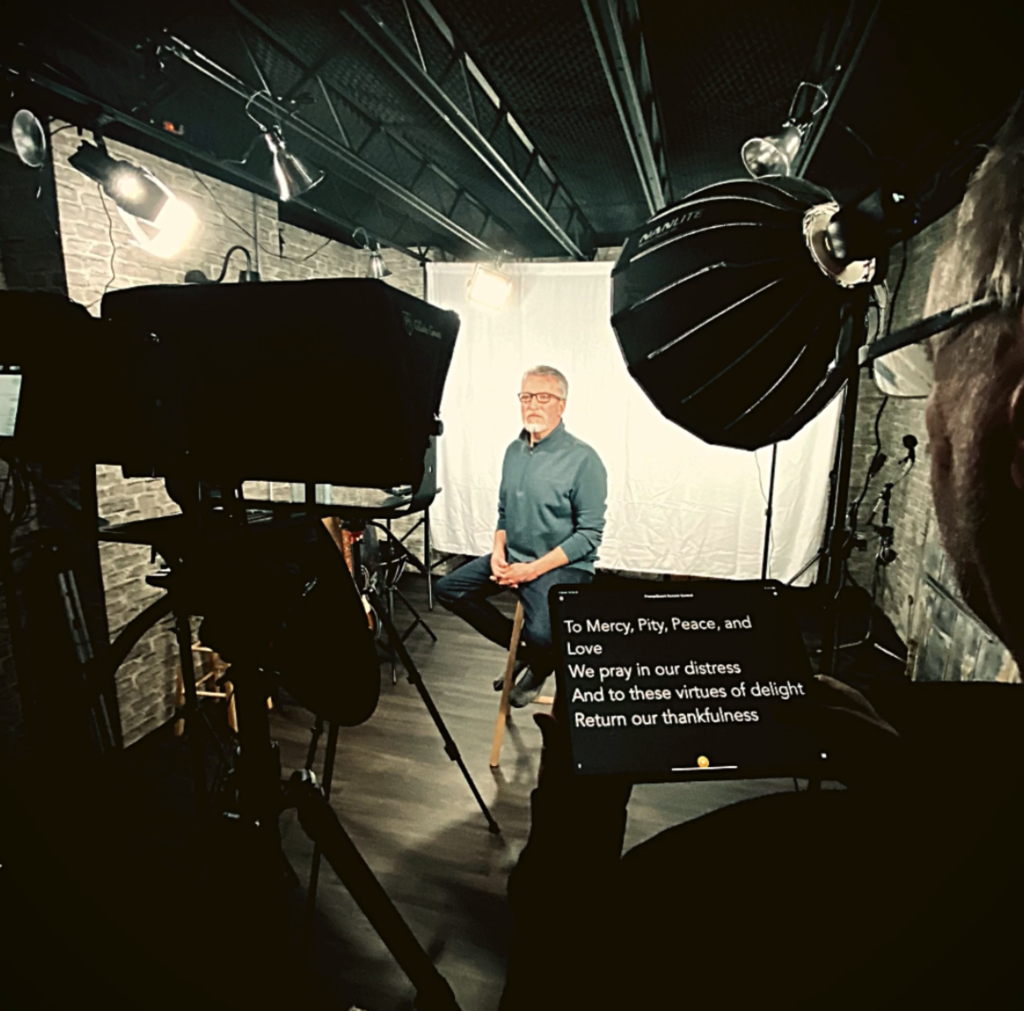
Some Thoughts Behind the New Song and Video: The Divine Image
by Steve Bell
Whoever is slow to anger is better than the mighty, the one who rules their spirit than one who captures a city.
Proverbs 16:32
Whoever is slow to anger has great understanding, but the one who has a hasty temper exalts folly.
Proverbs 14:29
I am not typically one to lob Bible verses like holy hand grenades at situations that are otherwise beyond my control. However, sacred wisdom, such as we find in ancient psalms and proverbs, survives as it does precisely because it speaks into the particular challenges of every age—especially those times when social disintegration threatens to overwhelm the security that harmonious communities otherwise enjoy.
We are certainly in such a time. Our social media feeds are increasingly dominated by anger, acrimony, accusation, and outrage. So many of us have contributed, whether in our feeds or in our hearts, to the fragmentation of relationships and institutions we once cherished and relied upon.
Lowering the Heat…
In his article, Lowering the Heat: Assuming Faithfulness in Disagreement, Brad Jersak observes that emotional reactions require alternative emotional responses. Fear, for example, seeks assurance. Grief wants comfort. Agitation responds to calm. “What does anger need?” he asks. “Understanding!” comes the answer. And I tend to agree.
It is a fairly natural response to provide assurance to someone who is afraid, comfort to one in sorrow, and calm to one who is agitated. But when confronted by anger, we typically respond with defensiveness and more anger. Yet, the way of Jesus asks something difficult of us who strive to be his followers.
He calls us to be peacemakers. He calls us to lower our fists and to honour the image of God in the other, even the hostile other. He goes as far as to call us to lay down our lives for the sake of our enemies. For the inalienable dignity of every person is that they have been made in the image of God. No qualifications. Full stop.
At the root and ground of our being, at the “center” of who we are, there is what Christianity calls ‘the image and likeness of God.
Bishop robert Barron, The Word On fire: The Gospels (p. 186)
Jesus bore witness to this counterintuitive way when he emptied himself, took on the form of a servant, and absorbed the rages of the ages into himself so that all might be free. And note that the freedom of Jesus seems to bear little resemblance to the “freedom” of modern aspirations. For example, when shown a Roman coin and asked to comment about an imperial tax designed to humiliate Jewish nationalist sensibilities, Jesus simply waves off the question.
The coin, he observes, has the image of Caesar on it, so give it to Caesar. (Mark 12:14-17) What concerns Jesus is the image of God in the human person. And the freedom to cherish that image is not something that any powers, overt or covert, can take away.
Lowering My Banner…
Regarding the current crisis we’re facing in Canada, I will not pretend for a moment that I don’t have strong opinions, convictions, and emotions. The fact that I am fully vaccinated and have publicly encouraged others to do so should give you a hint. But I quietly lowered my banner just a little the day one of my dearest friends stood on our driveway, and with a quivering lip told me of the compelling reasons he and his wife would not be getting vaccinated.
He then spoke of the painful alienation and shame he had to endure from those who didn’t have the patience to hear him out. This is the same man who once threw me a lifeline at a particularly low point in my life. I needed him then, and I need him now. I suspect he feels the same about me and I would be broken-hearted if he didn’t.
This Too Will Pass…
The more sincerely we attend to the stories of those we don’t readily understand, the more likely we are to recognize their humanity and retain them as vital friends and neighbors who share with us the distinction of being one of God’s beloved creatures.
This current crisis will pass. The tones we choose now will either underwrite or undermine our role in the process of healing to follow. Those who practice seeing and honouring the image of God in others now, in this season, will be better equipped and credentialed for the healing work of God in the next.
THE DIVINE IMAGE
Lyrics adapted from William Blake
Music by Steve Bell
To Mercy, Pity, Peace, and Love
We pray in our distress;
And to these virtues of delight
Return our thankfulness.
For Mercy, Pity, Peace, and Love
Is God, our Father dear;
In Mercy, Pity, Peace, and Love
Is God, our Mother, here.
And Mercy has a human heart,
Pity a human face,
And Love, the human form divine,
And Peace, the human dress.
Then everyone, of every clime,
That prays in their distress,
Prays to the human form divine,
Love, Mercy, Pity, Peace.
And all must love the human form,
in every stripe and hue
Where Mercy, Love, and Pity dwell
There God is dwelling too.
Yes, all must love the human form,
in every stripe and hue
Where Mercy, Love, and Pity dwell
There God is dwelling too.